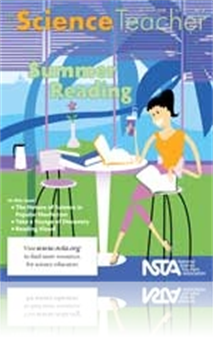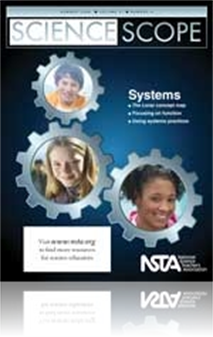All The Science Teacher resources
Journal Article
Creativity in the Science Classroom
Though many teachers would like to incorporate creative activities into their teaching, there are few practical suggestions to help them accomplish this goal (Yager 2000). In this article, the authors introduce four strategies to help integrate creat...
Journal Article
The Prepared Practitioner: Supporting New Teachers
New school years bring new challenges, students, lessons, and colleagues. Some teachers at your school may be just starting out with their first teaching job. Looking ahead to a new school year is a great time for all of us to think about understandi...
Journal Article
What can glaciers tell us about volcanoes and atmospheric conditions? How does this information relate to our understanding of climate change? Ice Core Investigations is an original and innovative activity that explores these types of questions. It b...
Journal Article
Idea Bank: Presidential “Periodic Table”
The Presidential “Periodic Table” is an engaging activity that encourages high school chemistry students to match the names of the elements with their chemical symbols in order to spell out the names of the 43 U.S. presidents. By completing the p...
Journal Article
Career of the Month: An Interview with Shark Advocate Sonja Fordham
Most sharks are the top predators in their ecosystems, yet they are often at the bottom of the conservation priority list. Because they are under-protected and exceptionally slow growing, and therefore valuable to overfishing, most of the world’s s...
Journal Article
Students’ understanding of science develops through everyday experiences. As a result, they come to the science classroom with their own notions of how the world works. As teachers, we often must help students overcome their prior naïve notions an...
Journal Article
Idea Bank: Emphasizing Safety in the Classroom
With the popularization of inquiry-based learning in science classes at all levels, laboratory instructors must be proficient in the proper handling of hazardous substances. This care in dealing with potentially harmful materials should also be commu...
Journal Article
In this article, the authors describe a two-phase inquiry lesson in which students explore the catalytic activity of amylase on starch (Rungruangsa and Panijpan 1979). In the first phase, students’ prior knowledge about the reaction is assessed thr...
Journal Article
A Message from the NSTA President: Science Education—The Times They are A-Changin’
Inspired by her favorite Bob Dylan song of 1964, “The Times They Are A-Changin,” NSTA President Page Keeley’s presidential theme during her 2008—2009 tenure will be “From Transition to Transformation—Striving for a Science-Literate Nation...
Journal Article
Editor’s Corner: Working Wages
Because of teacher retirement and other factors, our nation will need almost a quarter of a million new middle and high school science teachers over this decade (NSB 2006). If we want to recruit and retain the most talented individuals, science teach...
Journal Article
The Nature of Science in Popular Nonfiction
To help make science relevant to student’s everyday lives, the authors required their 10th-grade summer school students to read selections from a popular nonfiction science book. By doing so, they were able to promote literacy and provide an authen...
Journal Article
Realize Your Mentoring Success
How successful will you be in guiding a new teacher’s professional development? While your success will be influenced by how you and your mentee conceptualize teaching, learning, and the nature of science, research indicates that your success is al...
Journal Article
Systems Concepts Effectively Taught Using Systems Practices
This article describes two lessons within the authors’ education module entitled, Ecological Networks, that successfully teaches introductory systems content to middle and high school students. To catch students’ attention when teaching these new...
Journal Article
The Prepared Practitioner: Learning Science Beyond the Classroom
Have you ever learned science outside of school, free of fact-based standards and tests? Were you at a museum, national park, or maybe in front of a TV? Science educators refer to this kind of learning as free-choice learning or informal learning. Th...
Journal Article
Safer Science: Making Adjustments for Mobility-Impaired Students
Students’ mobility impairments need to be addressed for access to and safety in science laboratories. Typical accommodations for mobility-impaired students include workstations, sinks, fume hoods, and safety eyewashes and showers, in addition to ot...




